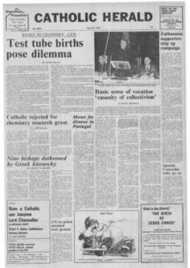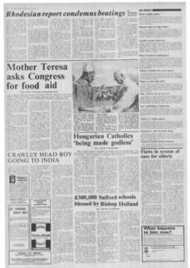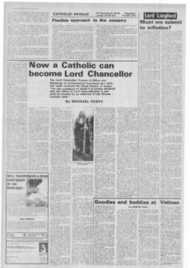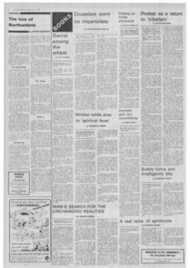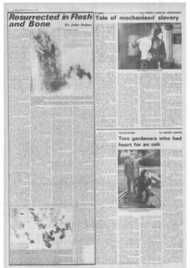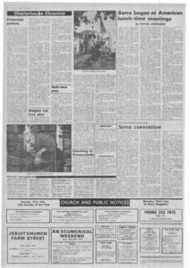Page 3, 19th July 1974
Page 3
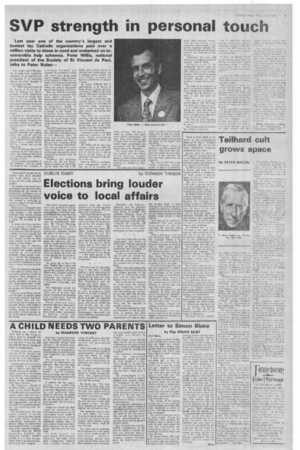
Report an error
Noticed an error on this page?If you've noticed an error in this article please click here to report it.
Tags
Share
Related articles
Teilhard Would Have Disapproved
Two Views Of
Teilhard And Man's Faith In Science
Holy Office Warns
Teilhard, The Man
Teilhard cult grows apace
by PETER NOLAN
More is soon likely to be heard of the controversial ideas of Fr Pierre Teilhard de Chardin, SJ, one of the most influential religious thinkers of our time.
Shortly after his death in 1955, aged 73, societies devoted to exploring and advancing his ideas and optimistic vision of the future began springing up all over Europe and beyond.
In 1966 a society was founded in Britain, and while at first largely confined to academics, the study groups it spawned began to attract a more diversified membership.
This now stands at about 1,300, with 44 groups and contacts from Edinburgh to Truro in Cornwall ready to spread the evolutionary gospel of Teilhard. Dr Robert Glynn Eaithfull, a modern languages lecturer at London University, principal of Braziers, the voluntary adult ccillege at Ipsden. Oxfordshire, and one of the commune which runs its farm, is the new chairman of the society.
He is also the father of Marianne Faithful!, the singer and actress, who successfully cured herself of heroin addiction and is, he told me, about to make a new recording.
Dr Faithful] aims to reach "the man in the street" more than has been attempted so far and one 'of the first ways of broadening Teilhard's appeal is to be the publication of a modestly priced newsletter called Interchange, later this year.
This is likely to reach a far wider circle than the society's eight-year-old magazine, The Teilhard Review, a high-level forum for futurologists, biologists, priests and other specialists attracted by Teilhard's work.
The Teilhard Review has a wide, if select, international circulation, being taken by university libraries all over the world, including the Catholic University of Lublin, in Poland. It is published three times a year at 50p acopy, and contains impressive evidence of the wide appeal of Teilhard's world vision and his ability to illuminate every field from theology to psychology and conservation. The current issue contains articles on life-cycles and destiny, on Teilhard and Alfred Adler, on Teilhard and original sin and on the Eastern and Western concept of time. All are by leading academics from a wide variety of disciplines. The society has also publish, cd a reply to Desmond Morris's hook, "The Naked Ape", called "Naked Ape or Homo Sapiens?" by Professor Bernard Towers and Dr John Lewis, finding much wrong with Morris's conclusions on. man's ethical responsibility, his aggressive drive and other things.
The book is one of a series of seven volumes by leading academics. including Dr Joseph Needham, the authority on China; Dr Robert Jungk, the futurologist, and Professor Roger Garaudy, the French Marxist who was expelled from the Communist Party in 1970.
All deal with aspects of Teilhard's thought, including one by six international theologians on "Hope and the Future of Man."
The society was among the first to introduce the ideas of Ivan Illich to Britain when it invited him to address a weekend seminar in 1971, where he explained his ideas on the need for a simpler level of technology and less wasteful use of resources.
Vice-presidents of the society include Professor Garaudy; Dr Margaret Mead, the anthropologist; Professor Raimondo Panikkar, the Catholic priest and theologian, and Canon David Jenkins. the Anglican theologian and author.
Dr Glynn Faithfull said he thought of himself as a humanist, and the wide range of ideologies and beliefs which the society represents has worried some people.
Miss Vivienne Lake, the secretary who has just taken over from Mrs Renee-Marie Croose Parry, honbrary sectetary of the society from the time it began, explained the society's policy.
Vivienne, a Catholic', has returned from Rome, where she was working with the United Nations Food and Agriculture Organisation, to take up the job.
The society has moved from its Kensington premises to St Mark's Chambers, Kennington, rented from the Anglican Church, which has made offices available to voluntary organisations.
Dialogue was at the heart of the society's existence, Vivienne said. The "Centre for the Future of Man," as the head quarters is called. was "committed to Christian-Humanist dialogue."
T had called himself a Christian humanist, and half the world followed non-Christian ideologies — a fact which needed to be taken into account in terms of Teilhard's evolutionary perspective — she added. The society officially Pectt "to encourage members • to relate Teilhard's thought to
their own spheres of a, i:-..ity for the common good" as ed as to stimulate Feilhardian study and debate.
It is financed by its members, and the centre possesses a Teilhardian library. which is open "to all interested persons."
Teilhard himself was not the . most gifted of communicators, and the books in which he expressed his highly original vision of the world make difficult reading, in addition to which he coined several new expressions to describe his fresh concepts.
Teithardians „talk -glibly of "The within and without of things," and ideas such as "the noosphcre" and Omega point—j or the unity of all in God — need careful explanation.
Though attacked by some as a dreamy Mystic, many believe he achieved much in working towards a synthesis between scientific insights and discoveries and religious beliefs.
There can be no doubt that his vision of God was the mainspring of all his actions, and anyone who stodies his life will admire his complete obedience to his superiors, who often made his work more difficult and delayed the publication of his ideas.
Even the scientifically illiterate cannot but-be impressed by his personal sanctity after :reading his hook, Le Milieu Dlvli
The society runs lecture courses on Teilhard, and next morith the study of Teilhard Will be part of a Hull University summer school.
In November the society is holding a seminar, open to the public, at Kensington College, London. to look at • Teilhard's idea of "inner and cuter space," or the subjective as against the social,
The tremendous appeal of Teilhard's ideas to so many people of all faiths or none has been clearly demonstrated through the society's activities. But for most Christians the significance of Teilhard's insights have yet to be admitted.
These were never more relevant in our world of everaccelerating change. of which Teilhard observed in his book "Christianity' and Evolution" ... "A Christ whose features do not adapt themselves to the requirements -of a world that is evolutive in structure will tend more and more to be eliminated out of hand."
People who want further information should coatrict the Teilhard Centre for in Future of Man, St Mark's Chambers, Kennington Park Road, London, SE11.
blog comments powered by Disqus


